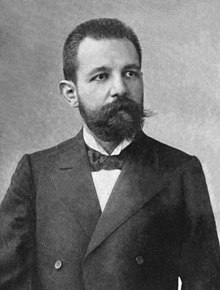Paul Lipke

|
|
| Paul Lipke, around 1900 |
|
| Association |
|
| Born | June 30, 1870 Erfurt , North German Confederation |
| Died | March 8, 1955 Osterburg |
| Best Elo rating | 2725 (October 1894) ( Historic Elo rating ) |
Paul Lipke (born June 30, 1870 in Erfurt , † March 8, 1955 in Osterburg ) was a German chess player . After 1898 he began to withdraw into professional life and thus ended his master career early.
biography
Lipke was a student at Magdeburg High School . After he had passed the Abitur exam in Halle in 1892, he studied law at the University of Halle and became a trainee lawyer in 1897 .
He then worked as a lawyer in Halle and Stendal . He later moved his legal practice. From the beginning of July 1909 he lived in Osterburg , which is about twenty kilometers north of Stendal.
Chess career
Lipke learned to play chess when he was about 14 years old. During his school days he became a member of the Magdeburg chess club . As early as 1889 he shared the 5th / 6th at the main tournament in Breslau, which Emanuel Lasker won. Place with Ignaz von Popiel . Lipke's first great chess success was winning the main tournament in Dresden in 1892, which, according to the rules of the German Chess Federation (DSB), entitles them to the championship title and to participate in the international DSB congresses .
This was followed by top placements in the tournaments of Halle in the same year (second prize) and Kiel 1893 (third prize). Lipke's greatest success was second place in the international congress in Leipzig in 1894, behind Siegbert Tarrasch and ahead of players like Richard Teichmann and Joseph Henry Blackburne . In Eisenach there was a match against Johann Berger in 1896 , which ended in a draw after seven games (1: 1, = 5). At the very busy "Kaiser Jubilee Chess Tournament" in Vienna in 1898, Lipke and Géza Maróczy shared eighth place out of 19 participants (Tarrasch won after a playoff against Pillsbury , followed by Janowski and Steinitz ).
Lipke was also considered a strong blind player and played up to ten games at the same time without looking at the board ( blind simultaneous ). In 1898, alongside Berger, he was editor of the Deutsche Schachzeitung and was responsible for editing the game section. Lipke was also the editor of the German Chess Papers, published in Coburg from 1909 onwards .
After he had turned away from serious tournament chess at an early age, Lipke remained active in chess clubs, including (from 1905) the Stendal Chess Society . In 1927 he was a co-founder of the Osterburg chess club , which existed until the Second World War. Even after that, Lipke participated in the chess life of his hometown at an old age.
After calculating his historical rating , Lipke was one of the top five players in the world in 1894 with a value of 2725.
Web links
- Replayable chess games by Paul Lipke on chessgames.com (English)
- Lipke's historic Elo rating based on Jeff Sonas
Individual evidence
- ↑ Deutsche Schachzeitung , No. 1/1900, p. 33f. The January issue also contained the portrait of Lipke used.
- ↑ Stendaler Schachchronik , entry under 1955; Deutsche Schachzeitung , No. 7/1909, p. 219.
- ^ The national tournament Kiel 1893 (8th DSB Congress) on TeleSchach (cross table and games)
- ^ The International Tournament Leipzig 1894 (9th DSB Congress) on TeleSchach (cross table and games)
- ↑ Deutsche Schachzeitung , 1896, p. 248; P. Feenstra Kuiper: Hundred years of chess battles. The most important chess battles 1851-1950 , Amsterdam 1967, p. 86.
- ↑ Werner Moritz and Horst Gerber: Sportive and cultural life, in: Heimatverein Osterburg (Altmark) eV (ed.): Osterburg in the 20th century. Contributions to the history of the city , Halle 2006, pp. 142ff. ISBN 9783898123105 .
| personal data | |
|---|---|
| SURNAME | Lipke, Paul |
| BRIEF DESCRIPTION | German chess player and lawyer |
| DATE OF BIRTH | June 30, 1870 |
| PLACE OF BIRTH | Erfurt |
| DATE OF DEATH | March 8, 1955 |
| Place of death | Osterburg |